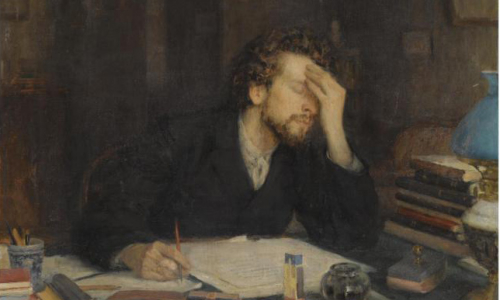
13 Must-Do Habits to Become a Successful Writer

Famous novel writers like Ernest Hemingway, J.D. Salinger, J.K. Rowling, and Oscar Wilde would not have been able to produce original and timeless works if not for their own unique set of writing principles and good writing habits. These habits need to be practiced every day, and great writing is essential to making it as a writer.
If you’ve been thinking about publishing the next Harry Potter, or if you simply need to enhance those skills for your own pleasure, read the following and get ready to establish good writing habits.
Habit #1: Do read, and do plenty of it
You’ve probably heard this before, but this is the oldest trick in the book. The younger you are, the sooner you should start to read. Anything form non-fiction, philosophy, science to religion, you must spend as much time reading as you are writing. This will continuously expand your knowledge and imagination—almost an autopilot writer’s routine.
Habit #2: Write briefly every day
Ernest Hemingway once said “I write every morning.” And Haruki Murakami added: “The repetition itself becomes the important thing.” Professional writers have a writing strategy where they only consume fifteen minutes to not more than five hours in a day. Why? The simple answer is this: Writing is a tiresome pastime/occupation to the mind. However with the right duration, one is able to release just the creative juices a writer needs to write the profound ideas or quirks they have for the day. Try writing a few poems or a short story a day. You’ll find how well this will elasticize your skills as a writer. It will make you more versatile. If writing is a passion, write first, and always write what is most important.
Habit #3: Push yourself physically
Did you know that in order to prepare himself mentally, Haruki Murakami runs 10 kilometers per day? Kurt Vonnegut used to take a break from writing by performing pushups. While exercise may not stimulate everyone, breaking a sweat may just be one move to summon your breaking work of literature.
Habit #4: Write powerfully
Writing powerfully doesn’t mean writing with always highfalutin or angry words. To write powerfully, one writes gracefully and captivatingly—no vague descriptions, no dangling sentences and fragments. Negate less. Write with a clear active voice. The subject and verb should be close. Finally, don’t beat around the bush.
Habit #5: Write for your audience
Well-loved authors would not have achieved their well-praised works if they only wrote for themselves. Create a good writing habit of rereading your works out loud as if you were a stranger instead of the author of that work. Try asking comments from your friends, English professor or workshop classmates. This will enable you to view your work from another perspective and see how it really impacts the readers from their own viewpoint. Then, you can make enhancements with the observations you find.
Habit #6: Refrain from common mistakes
From basic grammar rules to using conjunctions and transitions, always be cautious when repeating common errors. These tiny slips are sloppy and will blemish your final product. Review the rules of grammar and learn new ones. Ask questions and allow criticisms. This will help you become an excellent writer with good writing habits.

Habit #7: Be direct to the point
An essential rule to good writing is to be concise and organized. A work is concise when it contains just the right amount of paragraphs to relay significant issues, provide evidence, or tell a wonderful story. According to William Zinsser, writer, editor and literary critic, “Clutter is the disease of American writing.” Filter out the unnecessary fluffy phrases, pompous choice of words and empty jargons, and only fill in the final work with coherent, creative, and relevant statements.
Habit #8: Remove all distractions
Whether it’s the internet or influence of peers, always always put on a fence andset time for writing alone—zero distraction. They say a writer gets writer’s block and one of these hindrances may actually come from too much exposure to outside sources resulting in less careful, creative thought.
Habit #9: Review, revise, and rewrite
Writing a good novel or writing a great poem does not come without commitment and persistence. Effective writing is exhausting. There’s no escaping the review, revise, and rewrite stages of course, but do acknowledge these are steps to author greatness. Even when you’re practicing, always make a habit of writing a draft. Reviews, revisions and rewrites are more than necessary.
Habit #10: Don’t forget to be social
Contrary to what many believe, writers aren’t solitary creatures. In fact, one learns more from others than just thinking to oneself. Join a writing community, a book club, or share your work in a magazine or radio. Perhaps a simple social-media post that will rouse the mind of viewers can be your starting point. You can also do blogs about food or your adventures. Allow for others to dip into your works and hear their opinions. Allow your creativity to grow within a network of interested audiences.
Habit #11: Welcome the struggle and remain dedicated
If you’re one of those writers ready to reduce your work into ashes or scold yourself for a badly-made piece, don’t worry. It’s normal. Writing truly is laborious. But when you keep your inspiration and remind yourself why you write, it becomes both a labor and passion that could just turn into an unforgettable piece of work.
Habit #12: Don’t set the bar too high
A well-respected author doesn’t become famous overnight, much like a baby can’t learn to walk without practice. When writing your works, try to lower your expectations. It’s not going to be a Pulitzer in the beginning, but that’s the reason why drafting, reviewing, and rewriting are important. Success is 99% hard work and 1% talent according to great minds like Einstein. Popular author Barbara Kingsolver once said: “I have to write hundreds of pages before I get to page one.”
Habit #13: Celebrate success
Whether you’ve aced English class, received wonderful remarks from your English professor, or have just self-published your very first novel, it’s important to celebrate the momentous triumph without jumping right down to your next work of fiction or non-fiction. Take time to feel proud and celebrate the accomplishment you’ve made. If you’ve written one poem per day for 365 days, give yourself a toast. Every small achievement is a great victory. This will help you stay motivated to write.
Your best works are yet to come and it’s only a matter of time before you write your tour de force. Keep these good habits to great writing and never allow for one disappointment or struggle to discourage you. Write and keep on writing!
Leave a Reply


